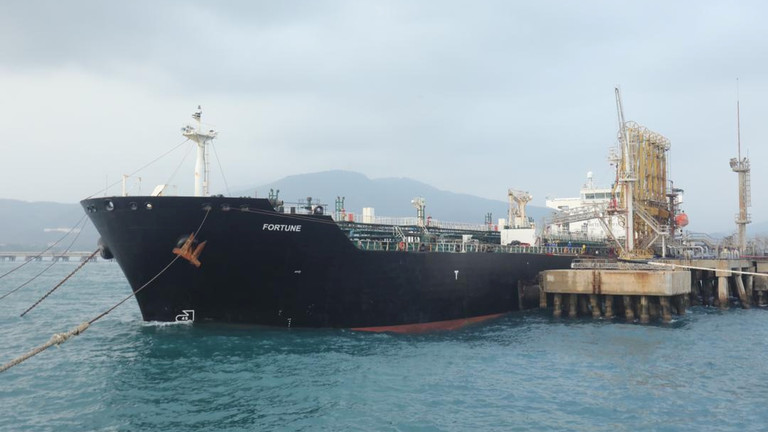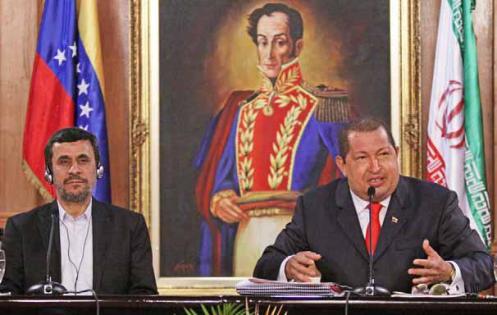Yesterday (Monday 8 May) Iran’s Supreme Leader Imam Sayyid Ali Khamenei praised the crews responsible for carrying the shipments of processed fuel and precursor chemicals to supply the oil refineries in Venezuela notwithstanding the US threats to prevent the shipments, writing via Twitter:
To the Iranian oil tankers’ crew that sailed to #Venezuela: In the Name of God, the Compassionate, the Merciful May God give strength to you dear ones, the Captains and staff. You did a great job. It was Jihad & brought honor to the country. May you be successful, God willing. LINK
Probably a decisive factor in Trump’s decision not to attempt an interception by force majeure was Iran’s missile attack on the US base in Iraq in response to the January assassination of Iranian Major General Qasem Soleimani. It appears that lesson has been learnt, for the moment at least.
While the arrival of the five Iranian tankers to Venezuela was a major morale booster for both countries and a humiliation for the US Establishment, the US shows no indication of relenting and is seeking other, less risky means to break the ability if not the will of the two defiant countries. It proceeded to expropriate and ransack Venezuela’s multi-billion dollar investment in the US (Citgo), through a fraudulent judicial procedure.
Shortly after the fuel shipments arrived the US announced it was sanctioning maritime companies that shipped Venezuelan crude last year. And yesterday (8 June), US Secretary of State Mike Pompeo announced that the sanctions against the Islamic Republic of Iran Shipping Lines (IRISL) and its Shanghai-based subsidiary, E-Sail Shipping Company, “have come into effect,” 180 days after the restrictive measures were first announced under the claim of Tehran’s support for proliferation of weapons of mass destruction.
The efforts to achieve by economic blackmail and sabotage what the US has been unable to achieve through brute force promises to inflict further suffering on the people of both nations: the objective is as simple as it is ruthless and cruel, ‘make the economy scream’ (as Kissinger commented in the early 1970s as he plotted to destroy the government of Salvador Allende in Chile). Or, as applied against Iraq during the 1990s.
As Madeleine Albright stated, ‘the price (hundreds of thousands of children dying from malnutrition) is worth it.’ LINK
The US, indeed most of the ‘international community’ for that matter, still thinks the price is worth it in Yemen too, as they continue to impose sanctions and support a land, sea and air blockade against the country waged by two countries that are as far away from democracy, human rights and the rule of law as any on the planet (Saudi Arabia and the United Arab Emirates), in order to reinstall a former president who was never elected by the people of Yemen in the first place.
The official greeting extended by the crew of the Venezuelan navy vessel sent to escort the first Iranian tanker to arrive, will resonate with many people in both regions (the Middle East and Latin America) for a long time to come:
In accordance with maritime law, international law, and naval agreements, and as a gesture of friendship, we will accompany you under the protection of our escort to your destination port.
Venezuela and Iran continue to be points of reference for revolutionary processes in Latin America and the world. We are sure that with the cooperation and solidarity of the Iranian people we will advance together to guarantee the full freedom and happiness of our sister nations.
The latest dangerous stand-off between the US and the Iran-Venezuela Axis of Unity and Resistance, and the latters’ success, was not a haphazard occurrence. It follows a steadfast course of building relations and consolidating economic, military, diplomatic and cultural ties and bilateral projects over two decades.
Trade between Venezuela and Iran grew rapidly under Nicolas Maduro’s predecessor, Hugo Chavez, growing from just $1.5 million in the first years of the 21st century to over $20 billion between 2002 and 2007. Beyond trade, the Bolivarian government has considered Iran as a key geopolitical ally against a common adversary, particularly following the failed US-backed military coup attempt in Venezuela in 2002, forging a large number of agreements and ventures. LINK
Following the election of President Ahmadinejad in 2005, the relations between Caracas and Tehran deepened as both countries became the subject of intense pressure and criticism and threats from the US. At the Non-Aligned Movement Summit in Cuba in 2006, Chavez claimed that he would defend Iran from any threat of invasion. Not long after, Ahmadinejad publicly stated that he would back Venezuela’s bid for a seat on the United Nations Security Council. In 2007, the two leaders claimed that they were strengthening an “axis of unity” against the United States.
Another factor that reinforces their diplomatic, economic and cultural bonds is that both countries have turned to Russia and China for their military defence as well as for consolidating their programs of economic and industrial development and diversification, drawing Iran and Venezuela even closer together under a common defence umbrella. In July 2008, Chavez visited Russia to finalize the purchase of military equipment, including Tor-M1 air-defence systems, diesel submarines, and Ilyushin warplanes. He followed with a similar visit to China to negotiate bilateral relations agreements and, reportedly, to offer to buy Chinese K-8 military training planes. The deepening of relations with Russia and China has undoubtedly been crucial to their ability to withstand the US pressure, sanctions and other attacks.
As of August 2014, Venezuela and Iran had signed 265 agreements deriving from 58 projects in the industrial, environmental, agricultural, commercial, educational, sports, housing, cultural, energy and scientific and technology areas. Although not all of the projects have been commercial successes, they have provided invaluable experience and strengthened both countries skill base and industrial capacity.
Iran has helped build platforms in a $4bn development of Orinoco delta oil deposits and petrochemical plants in exchange for reciprocal Venezuelan investments.
Other forms of bilateral cooperation include major construction and infrastructure projects, including housing, roads, dams and in transport.
In 2004Iran concluded an agreement on a $15 million investment with Venezuela to operate a tractor assembling plant in the region of Guayana. The factory was inaugurated the following year. The project reactivated a tractor assembling plant in Ciudad Bolívar, with capacity to assemble around 4,000 tractors per year.
The firm Iran Tractor Manufacturing Company (Itmco) controls 51% of the project, while the State owned Venezuelan Corporation of Guayana controls the rest. The Iranians supplies most of the parts of the engine and Venezuela supplies the electrical parts.
In 2007 the joint car company Venirauto released its first 300 units at an event in Caracas. The factory is located west of Caracas in Maracay.
In 2012 Venezuela announced that it was collaborating with Iran to develop and produce a fleet of surveillance drones to patrol the country’s borders. The Arpia-001 drones are based on Iran’s Mohajer series drones.
In a televised speech to military officers at Venezuela’s Defence Ministry during the plant’s inauguration, Chavez said the aircraft only carries surveillance cameras and was exclusively for defensive purposes, primarily for the conduct of surveillance patrols along Venezuela’s borders.
The drone is 13 feet (4 meters) by 8 feet (2.5 meters), could fly as high as 10,000 feet (3,000 meters) and for as long as 90 minutes. Venezuela has produced three of them, he said.
“We are doing this with the help of different countries including China, Russia, Iran, and other allied countries,” he added, apparently referring both to drone construction and to other projects including a munitions and weapons factory.
Although the battle is far from over, the two countries continue to withstand the US’ attempts to overthrow the countries’ independent leadership and install regimes that will obey and serve the modern-day Empire’s orders without pause or question. Their carefully constructed relationship of mutual support and assistance remains fundamental to their future success.
MORE ON THE TOPIC







